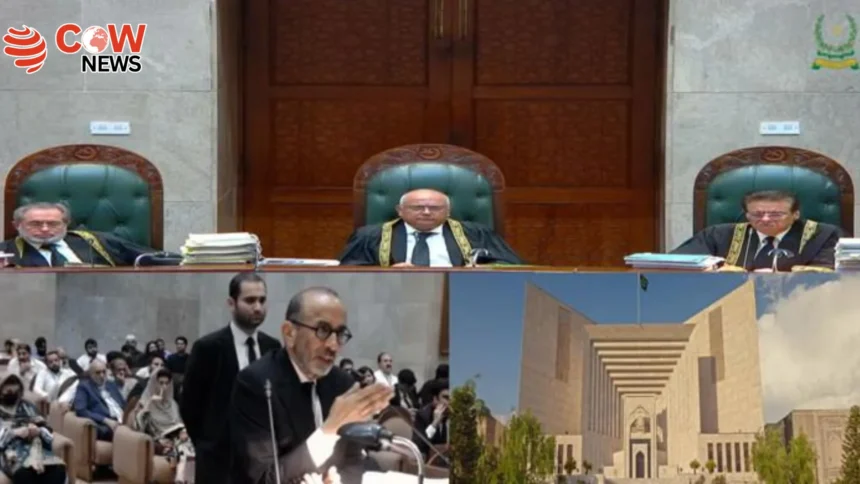Supreme Court Upholds Peshawar High Court Verdict, Cancels PTI’s Reserved Seats
Islamabad ( The COW News Digital )In a landmark judgment, the Supreme Court of Pakistan has accepted the review petitions challenging the allocation of reserved seats to Pakistan Tehreek-e-Insaf (PTI) and upheld the Peshawar High Court’s decision, declaring the previous order to award reserved seats to PTI null and void. The apex court’s decision came after extensive hearings and detailed deliberations over a contentious political issue that has been under judicial scrutiny for months.
The case revolves around the distribution of reserved seats in the National and Provincial Assemblies, a politically sensitive topic that has sparked debate between rival parties. Earlier, a 13-judge constitutional bench of the Supreme Court had ruled in favor of PTI, granting the party a significant number of reserved seats based on the Election Commission’s initial decision. However, subsequent petitions filed by opposition parties challenged this verdict, leading to the current review proceedings.
The Supreme Court held 17 hearings on the matter, with the Attorney General presenting the government’s arguments. The review petitions were argued before a specially constituted constitutional bench headed by Justice Amin-ud-Din Khan.
On the day of the verdict, Justice Amin-ud-Din Khan announced a concise summary of the judgment. The bench, with a majority of 7 to 5 judges, accepted the review petitions and reinstated the Peshawar High Court ruling that had declared the allocation of reserved seats to PTI unlawful.
The seven judges in the majority included Justice Amin-ud-Din Khan, Justice Musarrat Hilali, Justice Naeem Akhtar Afghan, Justice Shahid Bilal, Justice Hashim Kakakhel, Justice Amar Farooq, and Justice Ali Baqar Najafi. They ruled that the Election Commission’s earlier decision regarding the reserved seats was flawed and unconstitutional in the context of PTI’s claims.
Two judges, Justice Hasan Azhar Rizvi and Justice Muhammad Ali Mazhar, issued a conditional acceptance of the review petitions, instructing the Election Commission to re-examine the nominations of 80 candidates within 15 days and decide the final allocation of reserved seats accordingly.
Justice Jamal Khan Mandokhel maintained his previous opinion in part, holding that the review should apply to only 39 reserved seats instead of the full 41 seats initially allocated to PTI.
Justice Salahuddin Panhwar dissented by withdrawing from the bench, while Justices Ayesha Malik and Aqeel Abbasi had dismissed the review petitions early in the proceedings.
Following the Supreme Court’s ruling, the reserved seats for various parties in the National Assembly and provincial assemblies were realigned. A total of 77 reserved seats were restored to other political parties, redistributing the seats previously allocated to PTI.
- National Assembly:
- Pakistan Muslim League-Nawaz (PML-N) received 14 reserved seats.
- Pakistan Peoples Party (PPP) was allocated 5 seats.
- Jamiat Ulema-e-Islam (F) got 3 reserved seats.
- Punjab’s reserved seats for women were restored to 11.
- Khyber Pakhtunkhwa’s women’s reserved seats were reinstated at 8, with 3 seats for minorities.
- Provincial Assemblies:
- In Khyber Pakhtunkhwa, JUI-F secured 10 seats, PML-N 7, PPP 7, and Awami National Party (ANP) 1.
- Punjab Assembly restored 24 women’s reserved seats and 3 minority seats, divided among PML-N, PPP, and others.
- Sindh Assembly restored 2 women’s seats and 1 minority seat to PPP and MQM respectively.
The verdict has elicited strong reactions from all sides of the political spectrum. PTI Chairman and leadership have expressed profound disappointment, labeling the ruling as unjust and a blow to the democratic process. They argue that the Supreme Court has misinterpreted the constitution and undermined the party’s electoral mandate.
Barrister Gohar, a legal representative associated with PTI, condemned the judgment as unfair and reflective of political bias, asserting that it undermines the principles of justice and the constitution. He vowed to pursue protests and public demonstrations at both the assembly and grassroots levels against the verdict.
Opposition parties, on the other hand, welcomed the decision as a restoration of constitutional order and an affirmation of the Election Commission’s authority to oversee fair seat distribution.
The Supreme Court’s decision highlights the complex legal framework governing reserved seats in Pakistan’s parliamentary system. Reserved seats for women and minorities are allocated proportionally based on the number of general seats won by each party, a process overseen by the Election Commission.
The dispute centered on whether PTI’s reserved seats were allocated according to the proper interpretation of relevant election laws and constitutional provisions. The majority opinion in the Supreme Court concluded that the prior award to PTI was inconsistent with these rules, warranting reversal.
This landmark judgment marks a significant moment in Pakistan’s political and judicial landscape. It underscores the ongoing tensions between political parties regarding representation and highlights the judiciary’s crucial role in resolving electoral disputes.
With the Supreme Court’s ruling final, the Election Commission is now tasked with implementing the decision and reallocating reserved seats accordingly. The political ramifications of this decision are expected to reverberate in the lead-up to upcoming elections and parliamentary proceedings.
The verdict also raises broader questions about the independence of electoral institutions, judicial interpretation of the constitution, and the balance of power among Pakistan’s political stakeholders.







